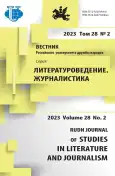Television of the Republic of Tatarstan as an instrument of national identity
- Authors: Dautova R.V.1, Tikhonova O.V.2
-
Affiliations:
- Kazan Federal University
- Lomonosov Moscow State University
- Issue: Vol 28, No 2 (2023)
- Pages: 318-332
- Section: JOURNALISM
- URL: https://journal-vniispk.ru/2312-9220/article/view/318907
- DOI: https://doi.org/10.22363/2312-9220-2023-28-2-318-332
- EDN: https://elibrary.ru/QZILOV
- ID: 318907
Cite item
Full Text
Abstract
The study of the role of regional television in national identification has gained particular relevance in the context of contemporary processes of mediatisation and globalisation. The theoretical significance of the results is related to the identification of the techniques of media identification in a historical perspective, as well as to the discovery of the factors influencing the identification process. The authors present the results of a study of both the historical experience of the development of state television in the territory of Tatarstan and the modern practice of the TV channel “Tatarstan - New Century”, which is currently considered the main national channel in the republic. The degree to which the topic of regional television development in Russia and around the world has been studied in terms of the specifics of national broadcasting, and studies which address the problem of ethnic identification through the media have been taken into account. A large body of empirical material was used to identify traditions and innovations in the activities of regional television, whose mission is to preserve and develop the native language, cultural and historical heritage. Through the analysis of empirical data the continuity of regional television traditions in relation to the national component is shown for the first time.
About the authors
Rezida V. Dautova
Kazan Federal University
Author for correspondence.
Email: RVagiz@yandex.ru
ORCID iD: 0000-0003-0125-8727
Doctor of Historical Sciences, Professor, Professor of the Department of TV Production and Digital Communications, Institute of Social and Philosophical Sciences and Mass Communications
18 Kremlyovskaya St, Kazan, 420008, Russian FederationOlga V. Tikhonova
Lomonosov Moscow State University
Email: tihonovao@list.ru
ORCID iD: 0000-0002-3348-4537
Candidate of Philological Sciences, Associate Professor, Associate Professor of the Department of Television and Radio Broadcasting, Faculty of Journalism
9 Mokhovaya St, bldg 1, Moscow, 125009, Russian FederationReferences
- Aituganova, M.L. (2012). Stages of formation of the national satellite TV channel “Tatarstan – Novy Vek” (Kazan, April 2012). Kazan Federal University. (In Russ.)
- Cardiff, D., & Scannell, P. (1987). Broadcasting and national unity. In J. Curran, A. Smith & P. Wingate (Eds.), Impacts and Influences: Essays on Media Power in the Twentieth Century (pp. 157–173). London, NewYork, Methuen: Routledge. https://doi.org/10.4324/9781315024608
- Cormack, M.J., & Hourigan, N. (2007). Minority language media: Concepts, critiques and case studies. Clevedon: Multilingual Matters LTD.
- d’Haenens, L., & Sayes, F. (Eds.) (2007). Western broadcast models. Structure, conduct and performance. Berlin, New York: Mouton de Gruyter.
- Dautova, R.V. (2019). Power and regional mass media: The history of relations. The period of “Khrushchev Thaw” in the republics of the Volga and the Urals. Kazan: Unicorn Publ. (In Russ.)
- Dolgova, Y.I. (Ed.). (2021). Television journalism. Moscow: Aspekt Press. (In Russ.)
- Ershov, Yu.M. (2012). Television of regions in search of development models. Moscow: MSU Publ. (In Russ.)
- Fatykhova, M.Kh. (2015). Propaganda editorial staff of the Kazan Television Studio as an element of Soviet ideology. Scientific Bulletin of the Belgorod State University. Series: Humanitarian Sciences, 28(24), 118–121. (In Russ.)
- Iosifidis, P., Steemers, J., & Wheeler, M. (2005). European television industries. London: British Film Institute.
- Lester, L., & Hutchins, B. (2011). Soft journalism, politics and environmental risk: An Australian story. Journalism, 13(5), 654–667. https://doi.org/10.1177/1464884911421706
- Maidurova, O.F. (2011). Information genres in regional news television programs: Current trends. St. Petersburg: SPbSU Publ. (In Russ.)
- Mongilyova, N.V. (2015). Research into functioning of the state language in the situation of mass bilingualism of North Kazakhstan using the differential technique. SAGE Open. 5(3). https://doi.org/10.1177/2158244015593120
- Raboy, M., & David, T. (2005). The trial by fire of the Canadian broadcasting corporation. lessons for public broadcasting. In G.F. Lowe & P. Jauert (Eds.), Cultural Dilemmas in Public Service Broadcasting (pp. 251–276). Goteborg: Nordicom.
- Roth-Ey, К. (2011). Moscow prime time: How the Soviet Union built the media empire that lost the cultural cold war. Ithaca, NY: Cornell University Press.
- Rzhanova, S.A. (2012). The Place of national television programs in the ethno-cultural space of the region. Humanitarian: Actual Problems of the Humanities and Education, 18(2), 103–106. (In Russ.)
- Sinclair, J., & Turner, G. (Eds.). (2004). Contemporary world television. London: British Film Institute.
- Tikhonova, O.V. (2017). Content analysis of Russian audiovisual media in national languages (on the example of Tatarstan, Bashkortostan and Chuvashia). Ethnic Journalism: History and Modernity, (10), 42–47. (In Russ.)
- Volkova, I.I., Proskurnova, E.L., & Tran Thi Thuy Dung. (2021). Prospects of news television: Materials of in-depth interviews. Nauchnyi Dialog, (3), 157–170. (In Russ.) https://doi.org/10.24224/2227-1295-2021- 3-157-170
- Vukanovich, Z. (Ed.) (2009). Television and digital media in the 21st century: New business, economic and technological paradigms. Media Art Service International.
- Vyrkovsky, A.V., & Makeenko, M.I. (2014). Regional television of Russia on the threshold of the digital era. Moscow: MediaMir Publ. (In Russ.)
- Wilke, J., Heimprecht, C., & Cohen, A. (2012). The geography of foreign news on television: A comparative study of 17 countries. The International Communication Gazette, 74(4), 301–322. https://doi.org/10.1177/1748048512439812
- Zvik, V.L. (2006). National identification of TV channels in the era of globalization. Electronic media in the context of new challenges of the time. St. Petersburg: ITMO University. (In Russ.)
Supplementary files









